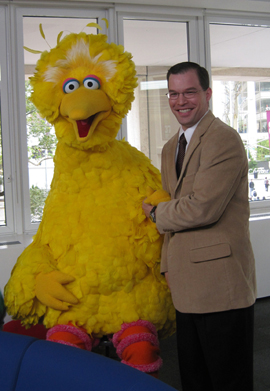After Big Bird was bullied on a recent episode of Sesame Street because the other birds said that his feet were too big and he was too yellow to join their club, Jamie Ostrov ’99 was there to offer the muppets advice.
As a developmental psychologist and associate professor at University at Buffalo (UB), Ostrov researches different types of aggressive behavior in children. His work involving one of those subtypes of aggression — bullying — led him to Sesame Street.
The show and an accompanying series of webisodes tackle the national concern about bullying as part of the program’s educational mission.
Ostrov was one of five experts who participated in the web series called “Happy to Be Me: An Anti-Bullying Discussion” that defines bullying and counsels parents and children on how to address the problem.
Ostrov’s work has garnered the attention of the Centers for Disease Control and Prevention as well as the U.S. Department of Education, for which he is one of the consultants who helped develop a uniform definition of bullying. In addition, Ostrov has assisted the federal StopBullying.gov initiative in adapting bullying-prevention materials for young children.
Although his research on aggression got under way as a łÉČËÍ·Ěő student, Ostrov’s curiosity about the topic was set into motion much earlier — when he started martial arts classes as a child.
“In traditional Japanese karate, you’re trained to avoid conflict,” the third-degree black belt said. “Trying to promote interdependence and social harmony were values that were not only instilled in me by my parents, but also solidified in my martial arts training — and it stuck.” Later, as a camp counselor in high school and director in college, Ostrov pursued his fondness for working with children. At camp, Ostrov witnessed a lot of behavioral problems, and he wondered, “What can we do?”
His interests and experience merged when, as a rising senior at łÉČËÍ·Ěő, Ostrov was a summer research assistant in the child psychiatry branch of the National Institutes of Health. He attended a talk by child psychologist Nicki Crick about relational aggression (undermining social relationships with others). Crick had developed a questionnaire that measured teachers’ opinions about which children used relational aggression.
Excited by Crick’s findings and seeing an opportunity to make an impact on the field, Ostrov proposed to his adviser, łÉČËÍ·Ěő psychology professor Carrie Keating, that he build on the research for his senior thesis. Over the next year, Ostrov and Keating observed local preschool children to test Crick’s research.
Noting the extraordinary time commitment and skills required for the project, Keating said, “This could not have been done by any ordinary student. Not everyone can successfully negotiate relationships with children, teachers, and parents — but Jamie could do it all.”
The first person to take “a paper and pencil measure and put [Crick’s] research to the test to show how accurate it was,” Ostrov was working at a master’s level, Keating said. And the mountain of data — which kept Ostrov and Keating in the lab into the wee hours of the night — was strong enough to get published in the prestigious journal Social Development. Bringing the experience full circle, Ostrov then attended graduate school at the University of Minnesota, where Crick became his mentor.
Today, as he continues to study aggression in early childhood, Ostrov’s work is an expansion of what he started at łÉČËÍ·Ěő. “We’re trying to capture the behaviors early on so that we can effectively intervene and reduce them,” he explained.
“He’s developed into a researcher who has a very keen eye for behavior at a very young age that is likely to eventually cause significant problems in terms of forming relationships,” Keating said.
As director of UB’s Social Development Laboratory, Ostrov is now training the next generation of researchers. He and his students conduct workshops for early childhood educators, parents, and families in western New York.
“We’re trying to reach as many people as we can,” Ostrov said. “If we want to get a handle on bullying and aggressive behavior in children, then we need to know what it is and what to do about it. Many families, educators, and even practitioners don’t realize that aggression is really problematic. They think it’s just boys being boys or girls being girls. Our efforts are to dispel those myths and disseminate good information so that we can all work together to decrease some of these problems in kids.”

